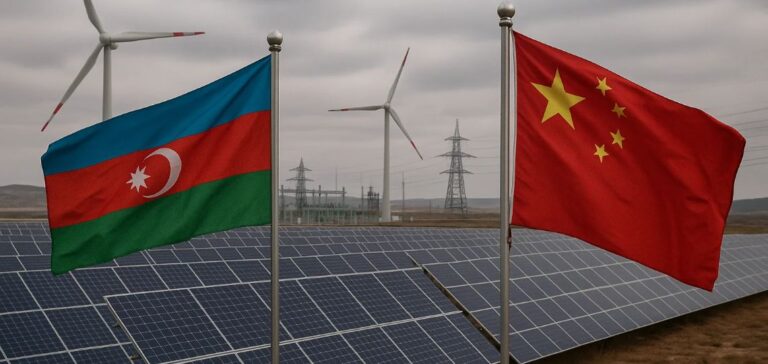As part of President Ilham Aliyev’s official visit to China, Azerbaijan signed six agreements with Chinese companies to develop renewable energy projects. These agreements cover initiatives in solar, offshore wind, and energy storage, marking a strengthening of energy cooperation between the two countries.
Major agreements in solar energy
One of the key agreements involves the construction of a 100 MW solar power plant in Gobustan, in partnership with “Universal Solar Azerbaijan” LLC. The project is expected to be operational by 2026, generating approximately 180 million kWh per year. It will significantly reduce carbon emissions, with an estimated 86,000 tonnes of CO2 avoided annually. The project will also be economically beneficial, saving around 39 million m³ of natural gas.
Offshore wind projects in the Caspian Sea
Another important agreement concerns the development of a 2 GW offshore wind farm in the Caspian Sea, in collaboration with “China Energy Overseas Investment Co. Ltd.”. This project is part of a strategy to diversify energy sources, with a planning phase that includes evaluating the region’s wind potential. The project is expected to ultimately provide substantial renewable energy production capacity, enhancing Azerbaijan’s energy self-sufficiency.
Partnerships for hybrid and energy storage projects
In the field of energy storage, another agreement was signed for the creation of a 100 MW floating solar power plant and a 30 MW battery storage system on Lake Boyukshor. This project will be managed by a joint venture, with “China Datang Overseas Investment Co. Ltd.” as the lead investor. Additionally, a further agreement was signed for the development of another 160 MW solar project, with an expected production of 332 million kWh per year starting from 2028.
Collaboration on energy grid planning
Finally, a memorandum of understanding was signed between Azerbaijan’s Ministry of Energy and the Electric Power Planning and Engineering Institute of China. This collaboration aims to study the integration of renewable energy into Azerbaijan’s power grid in the long term. The goal is to enhance the grid’s capacity to accommodate more green energy, while ensuring the economic and technical viability of these projects by 2028 and beyond.





















